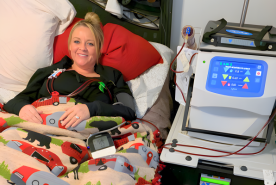April 19, 2022
Now that summer is approaching, many of our minds have turned to vacation plans. Whether you imagine relaxing on sandy beaches, tubing on a snow-capped mountain, or taking a tour around a city, here’s how to prepare for traveling while on dialysis.
Table of Contents
- Start here
- Documentation
- Hemodialysis and traveling
- Home hemodialysis and traveling
- Peritoneal dialysis and traveling
- Have questions about traveling while on dialysis?
Start here
Many people who receive dialysis can travel while continuing their treatments; however, you may have specific requirements not listed in this article. Discuss travel plans with your doctor and follow their guidance.
Once you have the green light from your care team, here are six ways to prepare for your trip:
- Medications: Make sure you have enough medicine for the entire trip. Keep them in your carry-on, as luggage may get lost, and bring a copy of the prescription with you, just in case.
- Insurance: Check with your health insurance company to see if they cover the cost of dialysis while traveling.
- COVID-19: Check the CDC travel requirements before traveling.
- Activities: Plan activities according to your abilities and allow for time to rest and recharge.
- Fluid and diet restrictions: Pack or plan to buy healthy and nutritious meals, snacks, and drinks that follow all dietary recommendations from your doctor or kidney nutritionist.
- Emergencies: Your personal doctor and the doctor at the local dialysis center will create a plan should you need to be admitted to a hospital while you are away from home.
Documentation
Your travel-destination dialysis center needs to know as much about you as possible to appropriately care for you. Keep a copy of your records with you at all times and have your home dialysis center also fax your records to the dialysis center you’re visiting:
- the dates you need dialysis treatment
- your name, address, etc.
- medical history and recent physical exam reports
- recent lab results
- recent EKG
- recent chest x-ray
- your dialysis prescription and 3 to 5 recent treatment records
- dialysis access type
- special needs or dialysis requirements
- information about your general health
- insurance information
- where you will be staying in the area
- a list of the medications you take during treatment and at home
Hemodialysis and traveling
Speak with your regular dialysis center about your travel arrangements at least 6 to 8 weeks before traveling- longer if your destination is popular. Some centers may help arrange your treatments or provide relevant information and documentation. You or your patient coordinator may need to contact multiple centers to find appropriate appointment times.
Home hemodialysis and traveling
Many people using home hemodialysis make arrangements for in-center treatments when they are traveling; however, it may be possible to continue with home treatment as usual. Check with your dialysis care team to see if you can travel with the machines, supplies, and portable water treatment equipment. Let a center know when you’ll be in the area and see if they can provide medical assistance if needed.
Additionally, most dialysis and equipment companies have toll-free numbers for 24-hour help. Write them down as they may come in handy.
Peritoneal dialysis and traveling
Traveling with a peritoneal dialysis system is often easier because there’s no need to use standard dialysis units. However, it may still be a good idea to arrange backup medical care.
Continuous ambulatory peritoneal dialysis (CAPD): Bring enough supplies to cover the length of the trip, plus extra supplies as a backup. You may be able to deliver supplies to the destination for extended stays.
Automatic peritoneal dialysis (APD: If your trip is one week or longer, you can have supplies delivered to your destination. Smaller cycler machines are also available, which are easier to carry on airplanes and use in smaller spaces like campers.
Have questions about traveling while on dialysis?
Our Patient Information Help Line, NKF Cares, can help! Call toll-free at 855.NKF.CARES (855.653.2273) or email nkfcares@kidney.org.


















